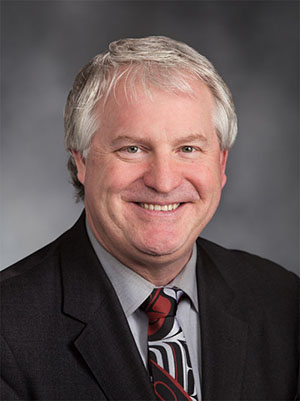— from Rep. Jeff Morris’ Office —
 Technology often drives change in how services are provided, and electric utilities aren’t immune, which is why Rep. Jeff Morris has introduced a bill giving them more flexibility in how they provide services and interact with customers.
Technology often drives change in how services are provided, and electric utilities aren’t immune, which is why Rep. Jeff Morris has introduced a bill giving them more flexibility in how they provide services and interact with customers.
Morris (D-Mount Vernon), chair of the state House Technology and Economic Development Committee, says in the near future resources on the distribution side of our electric grid will be one of the biggest drivers in how electricity is provided.
Distributive energy resources are generation or demand that is produced or consumed near or at your home. This could be such things as community solar gardens located at electric vehicle (EV) charging stations where EVs are parked during the work day, Morris said.
“The most efficient, reliable and least costly path forward is to have electricity supply and demand happen behind electric meters instead of expecting a coal or gas plant hundreds of miles away to provide that service,” Morris said.
“I want to give utilities and their customers the tools to take full advantage of new technology and its impact on the electric grid,” Morris said. “Now, they’re constrained by a 19th century business model and regulation based on how things used to be done. Let’s allow customers to decide what they want either through their own distributive generation or through their traditional providers.”
For example, Morris said, how about allowing utilities to provide electric vehicles and chargers, solar energy, or home energy management services to customers? “These are things customers want but can’t have because the current system doesn’t allow them to work together as a service.”
And, Morris said, his legislation (HB 1233) would also reduce or eliminate the “socialization” of cost of individual choices across all ratepayers. Instead, rates could be based on individual and neighborhood usage patterns. “You won’t have to help pay for your neighbor’s electric car or solar system.”
Morris acknowledged that change is never easy, but was encouraged by the positive testimony the bill received in committee. No utilities or interest groups signed in at the committee hearing as opposed.
“These are the best options that have been developed through studies and examination by our National Laboratories,” he said. “Best science doesn’t always survive our form of democracy in that it averages out competing special interest groups. But, I was glad that almost all testimony was positive.”
Brief Summary of Bill
- Authorizes an electric utility to develop an annually updated, 10-year Distributed Energy Resources Plan (DER Plan).
- Authorizes the Utilities and Transportation Commission to employ an alternative form of regulation for an electrical company.
- Allows a consumer-owned utility to provide other energy services and recover the cost of providing such services from its ratepayers if certain conditions are met.
- Establishes registration requirements for direct retail to electric consumer companies.
- Requires an electric utility that develops a DER Plan and that achieves a certain cumulative generating capacity of net metering systems to compensate customer investments in the distribution system, including but not limited to a net metering system, using the methods established in its DER Plan.
- Creates a pathway to establish a fund manager for public entities to monetize tax benefits of DER investments.
Rep. Jeff Morris, D-Mount Vernon (40th Legislative District), represents San Juan, and part of Skagit and Whatcom counties including Anacortes, Burlington and part of Bellingham and Mount Vernon.
**If you are reading theOrcasonian for free, thank your fellow islanders. If you would like to support theOrcasonian CLICK HERE to set your modestly-priced, voluntary subscription. Otherwise, no worries; we’re happy to share with you.**








Thank you Representative Morris! We look forward to following this bill and seeing how it can serve our members in San Juan County. Our grid will be ready – we began to install fiber in 2000 and have been modernizing our electric grid ever since. Our members were early adopters of local distributed power and OPALCO is committed to making best use of all available resources.